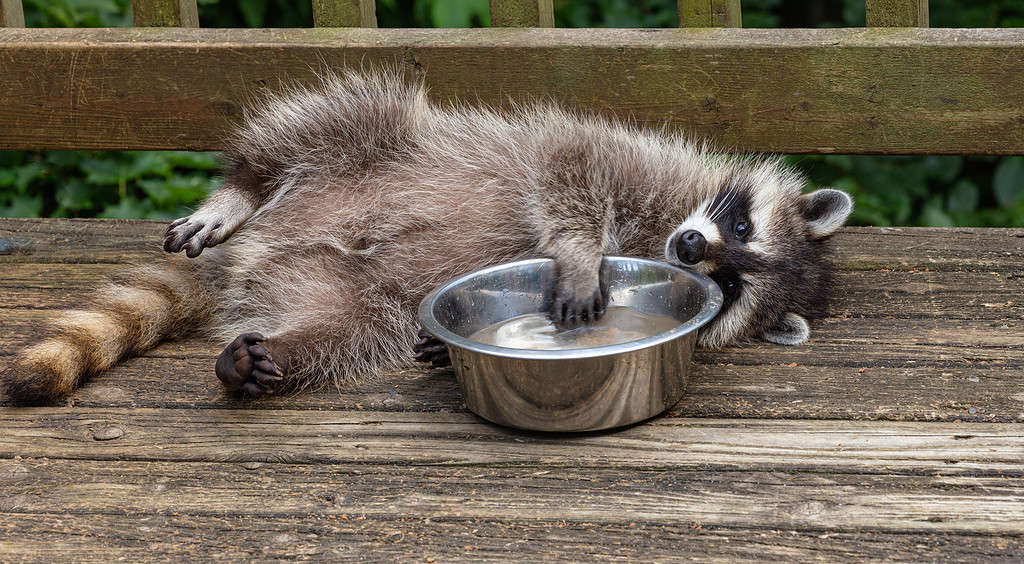Rabies is a disease that affects the central nervous system of mammals including humans. It can be carried by several wildlife species in the US (including foxes) and by domestic dogs. This raises the question of whether raccoons can have rabies. Raccoons are amongst the most common mammals in North America and have a characteristic black mask and ringed tail. They are members of the Procyonidae family and live in woodlands and grasslands. More importantly, they are also often encountered in suburban and urban areas where they come into contact with humans. Here we examine whether raccoons can have rabies and what you should do if you are bitten by one.
How Can You Catch Rabies?

Raccoons can infect humans with rabies through bites.
©vilma3000/Shutterstock.com
You catch rabies when the virus enters your body, invades your cells, and replicates. It is found in the saliva and brain/nervous system tissue of animals with rabies. For you to catch the disease, the virus needs to get through your skin and into your body. The most common way for this to happen is through a bite (or rarely through scratches). However, it can enter through mucous membranes such as those in your eyes and nose.
There are several different strains of rabies and raccoons can carry one strain which is called the ‘raccoon variant’. Raccoons with rabies have been identified in the southern and eastern parts of the United States. Domestic pets, including dogs, can also get rabies. However, dogs in the US are required to have a rabies vaccination.
What Are the Symptoms of Human Rabies?
Even though rabies is a rare disease, it is very serious. The symptoms usually start a few months after infection but can start quicker or take many months to appear. After initially suffering vague fever-like symptoms, victims often have a tingling sensation around the bite wound. This develops into either furious rabies (hyperactivity) or paralytic rabies (paralysis).
How Common Is Rabies in Raccoons?
Rabies surveillance carried out in the United States in 2021 identified 1,030 rabies cases in raccoons. The District of Columbia Department of Health (DC Health) has a robust animal bite and rabies surveillance system. All animal bites are reportable and are recorded. In 2020, 20 percent of raccoon samples tested positive, and in 2019, 17.6 percent of raccoon samples tested positive.
How Can You Tell if a Raccoon Has Rabies?

You cannot reliably tell if raccoons have rabies by looking at them.
©iStock.com/eddtoro
It is impossible to tell if a raccoon has rabies just by looking at it. However, some signs may indicate that they are suffering from rabies. These are:
- Being unusually friendly or calm.
- Being aggressive with snapping and lunging.
- Having a discharge from their eyes or mouth or salivating excessively.
- Having wet or matted hair on their face.
- Staggering or wandering around erratically.
- Not responding to noise.
- Making repeated and high-pitched noises.
- Looking for an isolated place to die.
When Are You Likely to Be Bitten by a Raccoon?
Raccoons can become very comfortable around humans. This can result in them setting up a home in your shed, garage, or even your attic. If they feel threatened, raccoons will bite and scratch humans. This is why it is not a good idea to try to approach the raccoon yourself. They could potentially infect you with rabies. They could also infect your pet cats and dogs. If a raccoon bites you, you should assume that they do have rabies. The animal should be euthanized and tests carried out to determine if they are carrying the rabies virus.
How Can You Avoid Getting Rabies From a Raccoon?

Pet raccoons can bite.
©Anne Wright Dobbelsteyn/iStock via Getty Images
Raccoons are most likely to give you rabies by biting you so if you can avoid getting bitten by a raccoon then the risk is greatly reduced. The best advice is not to approach raccoons in the wild even if they seem very tame. If you have a raccoon on your property, call in the experts to help you remove them.
In some states, it is legal to have a raccoon as a pet. Enthusiasts claim that it is possible to domesticate a raccoon and even housetrain them. They also claim that pet raccoons can be affectionate pets. However, keeping a raccoon as a pet is challenging. Some raccoons are more aggressive than others and there is always the danger that they will bite someone. Some raccoons are friendly when they are younger but become more aggressive as they get older. Having a raccoon as a pet immediately increases the opportunities for you to get bitten by one!
What You Should Do if You Are Bitten by a Racoon
If you are bitten by a raccoon, you need to get medical attention straight away. While you are doing this, someone needs to trap the raccoon so that it can be euthanized and tested. Your wound will be thoroughly cleaned using chemicals that kill the rabies virus. Unvaccinated people will then need a treatment called post-exposure prophylaxis which is human rabies immune globulin (HRIG). This treatment delivers vital antibodies to fight off the virus near the bite wound.
Also, you will be given the rabies vaccine. The first dose is administered as soon as possible and three follow-up doses are given in the following days. Healthcare providers are usually required to report these incidents.
Summing up Can Raccoons Have Rabies?
Can raccoons have rabies? Yes, and they can pass it on to humans through bites. Catching rabies from raccoons in the US is rare. You cannot tell by looking at a raccoon that it has rabies although there may be some behavioral changes that indicate infection. The best advice is to call in the experts to remove raccoons from your property and be mindful that having a raccoon as a pet carries a risk. If you get bitten by a raccoon, assume it has rabies. Confine it so that it can be euthanized and tested. Get immediate medical help which will comprise of wound cleaning followed by human rabies immune globulin and rabies vaccine for unvaccinated people.
The photo featured at the top of this post is © dangdumrong/Shutterstock.com
Thank you for reading! Have some feedback for us? Contact the AZ Animals editorial team.







